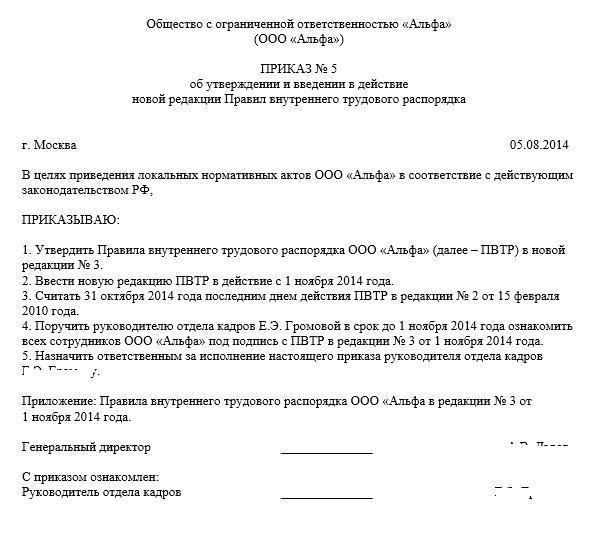Any organization, commercial or state, has its own documentation that defines disciplinary rules, official standards and other provisions. Such documentation includes a local regulatory act. These are those important documents that exist within the framework of the law and do not contradict it.
Definition
Consider what is meant by local regulatory documentation. 
A local normative act is a type of document that contains the provisions of labor law and is adopted by the employer in the established form and within its competence. This right is provided for by Article 8 of the Labor Code of the Russian Federation.
Taking into account the peculiarities of labor legislation, special requirements are established for local regulatory acts.
Varieties
Local regulatory acts can be divided into several types. These include:
- Mandatory documents. These are the principles of internal regulations, staffing, annual leave schedule, labor protection rules.
- Optional documents. These are provisions on bonuses, provisions on material incentives, a journal for familiarizing oneself with these documents.
Regardless of what type of documentation the acts belong to, it is important that they are published in the legislative framework and have no contradictions with the law. The most important characteristic feature for local regulatory documentation is its mandatory implementation for both the employer and employees.
Features
Local regulatory acts have the following features:
- All possible changes to the documentation can only be determined by the employer.
- All provisions in the documents do not contradict legislation or employment contracts.
- Any act must be approved in writing by the employer and issued in the form of instructions or regulations.
- Mandatory acquaintance of the employee with the entire list of such documentation. In this case, the employee must sign when he gets acquainted with the acts.
- The acts shall become legal from the moment of their adoption or from the date specified in the documents.
- Documents expire upon expiration or upon cancellation by the employer (in some cases, by the court).

Documents in the organization
Each organization has certain local regulatory acts. Their list will vary depending on the company itself and the established rules. The main documents, the presence of which is characteristic of many companies, include:
- internal organization conditions in the organization;
- staffing table;
- vacation schedules;
- instructions and regulations on labor protection.
In addition, the enterprises use the provisions on:
- payment of salaries and cash bonuses;
- personal data;
- vacations;
- business trips;
- certifications;
- trade secrets and liability.
Acceptance of documents
The local regulations of the employer in the organization go through more than one stage. It all starts with its development. Further, the act must be agreed upon and approved, after which the document receives legal force and is put into effect.
Such a sequence may also be established by a specific act. For example, this may be a provision on the procedure for the adoption of local regulatory acts.
Development, approval, approval
As mentioned earlier, in order for the act to be used in the work, the established order must be observed. 
The local normative act is developed by a special group of persons or by one executor, who were appointed for this purpose by the employer.This can be either an employee of the human resources department or chief accountant, or an association of the heads of different departments.
After the document is developed, it must go through the approval stage. The local act is consistent with other structural divisions and departments. All comments, criticism, comments, advice or disagreement with the established provisions of the employees are submitted on a separate form.
After approval of the normative document, it is sent for approval to the higher management. But before approving the act, the head of the organization must send it to the union. The representative body of employees has the right within five days to consider the developed draft document and put forward its consent or disagreement with this act. If consent has been received from the union, the act is put into effect. If disagreement ensues, then the document must be reviewed within three days and amended in accordance with the wishes of the representative body.
The following is a sample of a local regulatory act.
Registration
Labor legislation does not fix any requirements regarding the execution of normative acts. But according to GOST R6.30-2003, there are some conditions that must be observed when developing and preparing this kind of documentation.

A local regulatory act is a document that must be executed on a special form and include the following:
- full and abbreviated name of the organization (as indicated in the constituent documents of the company);
- Indication of the name of the document (in capital letters after the name of the organization);
- date of adoption of the document and its number during registration;
- place of creation of the act and its execution;
- the presence of signatures of all authorized persons;
- indication of the availability of annexes to this document;
- designation of sections (indicating the number and title), paragraphs and subparagraphs, which are a mandatory part of the content of the document;
- obligatory pagination (starts from the second sheet in the middle of the upper field);
- the stamp on the approval by the organization's management of the adopted document is required (upper right corner). The approval of the act can be presented as the signature of the head or, as a separately issued order, certified by the seal.
When compiling, you must follow the structure of the document. It should have a common part, main and final.
Acquaintance
Familiarization with local regulatory acts is specifically stipulated in the Labor Code of the Russian Federation. Taking into account part 2 of article 22 of the labor code, the employer is obliged to familiarize employees with those documents that directly relate to their labor activity.
According to part 3 of article 68 of the Code, the employer is obliged to acquaint new employees with all local acts that are related to their labor activities under signature.
It should be noted that employees should be familiar with only those documents that may directly affect them. These include: the internal routine of the company, vacation schedules, additional working conditions, etc. Moreover, if the position of the employee does not imply business trips, then it is not necessary to introduce this provision.

As already mentioned, it is necessary to acquaint the employee with the local act by signature. At different enterprises, this is done in different ways:
- A fact sheet can be attached to the normative document, where employees will have to put their signature. Such sheets must be stitched together with the act. This method is convenient for companies with a small staff.
- The organization maintains a special journal of acquaintance with regulatory documents, where employees signatures after familiarization. If a newly arrived employee is acquainted with the acts, then the phrase on familiarization with specific local documents may be included in his employment contract and a list of them will be given. This is acceptable for large enterprises.
Change or Cancel
If there are any changes in the legislation, the provisions of which were introduced into the local act, the employer is obliged to make the necessary amendments to the documents. The employer can make changes only at will, regardless of labor law. It is only important that such changes do not violate the rights of employees and do not worsen their situation.
All amendments are introduced in the order in which a local regulatory act is developed and approved. This is prescribed by law. Moreover, if the change concerns those conditions of the employment contract that were determined by agreement of the parties, then before making them, the employer must ask the consent of the employee. An employer can unilaterally change something in a local act only with organizational or technological changes in working conditions.
Anyway, normative acts are changed on the basis of the order of the head of the organization indicating the reasons for the necessary changes.

Article 12 of the Labor Code of the Russian Federation regulates those situations when local acts cease to have effect:
- Expiration This situation is possible if, during the development of the document, a specific period of its validity was determined. And upon the specified date, the document automatically expires.
- Cancel Such a situation is possible with the publication of another local act, which cancels the validity of this. The new document can cancel the provisions of the old act either fully or partially.
- The entry into force of a law that contains labor law rules establishing a higher level of guarantees for workers.
The cancellation of a local act must also be formalized by order of the head, with the exception of the first case.
Storage
All originals of valid local acts must be in one place. This is usually an office, human resources department or other unit of the organization. If an enterprise unit is guided by a specific act, then it needs to have a copy of the main document.

The storage period of local acts is determined by the List of standard administrative archival documents generated in the course of activities of state bodies, local authorities and organizations. It is approved by order of the Ministry of Culture. According to this document, all local regulations should be stored in the company where they were developed and approved, permanently.